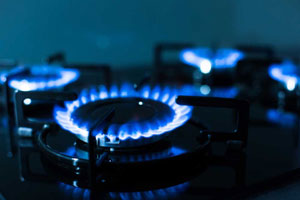
How Do I Know If I Have Gas Line Leak?
Though natural gas is odorless, tasteless and colorless, there are 4 common ways to detect a gas leak: foul odor, sounds coming from your gas line or appliances, open flames and a carbon monoxide detector.
Foul Odor
The most common sign of a gas leak is a sulfur or rotten egg-like odor. Since natural gas is undetected by the senses, utility companies add mercaptan-a harmless, sulfur smelling additive, so it is easily detectable.
Hissing Sounds Coming From Your Gas Line Or Appliances
Natural gas is pressurized, so a cracked pipe, ill fitting seal or loose connection allows gas to escape, which causes a blowing or hissing sound.
Open Flames
If a leak from an appliance or gas line has encountered a source of ignition such as an electrical spark of pilot light, it will create an open flame.
Carbon Monoxide Detector
Abnormally high amounts of gas in your home is usually detected by a carbon monoxide detector.
Blowing Dirt Or Bubbles Coming From the Ground
An underground gas leak is especially dangerous, because heavy dirt and soil can drown out the sulfur smell. However, blowing dirt, dust and bubbles in the ground can signal a leak in an underground gas line.
Discolored or Dead Vegetation Surrounding an Outside Gas Line
Discolored or dead vegetation surrounding a usually green patch of land can be a sign of an underground gas leak.
Why Is It Important to Handle This Issue Immediately?

Natural gas, or methane, is the most widely used energy source for households. When a leak occurs, methane gas, a normally harmless gas, replaces oxygen in an enclosed environment. When this happens, individuals in the home will become dizzy and disoriented, followed by a lack of coordination and concentration. As oxygen levels continue to drop, they will begin to feel exhausted and tired. Their heart rate and breathing will increase, and eventually they will become nauseous, lose consciousness and stop breathing.
Methane, or natural gas, is highly flammable. In fact, it only takes a small amount to produce heat. The right combination of oxygen and methane gas will create an explosion in enclosed areas.
If you detect a leak in or around your dwelling, do not attempt to pinpoint the leak, turn on electrical appliances, use open flames or smoke. If the leak is coming from outside the home, do not attempt to repair the gas line yourself. Contact a trained professional to repair the leak.
Because most leaks occur in the lower area of the home, if you begin to smell gas on the second level, it means a large amount has already filled the first floor, at which point, according to experts, individuals should evacuate the premises immediately, and contact a professional plumber to assess the leak.
Does your Salt Lake City home need urgent Gas Line Leak repair? Dial (801) 341-4222 now to contact Valley Plumbing's top notch services.

Providing Exceptional Service & Quality Workmanship, 24/7!
Book Appointment
Customer
Education
Education
No
Mess
Mess
Experienced
Plumbing Team
Plumbing Team
Hassle-Free Experience
Your experience matters. We make every effort to provide you with a pleasant, hassle-free experience that will leave you with the peace of mind you deserve.
Superior Customer Service
Our team not only possesses the technical skills to get the job done, but they are also passionate about providing the best customer service possible to every client.
Competitive, Honest Pricing
Not only do we strive to provide fast and reliable service, we do it at a fair, competitive price. You will always receive a free onsite estimate before we go ahead with any project.
24/7 Live Answer
You can count on Valley Plumbing and Drain Cleaning to ease the burden of plumbing and drain emergencies. Rest easy knowing you have a trusted 24-hour emergency plumber nearby to help!
